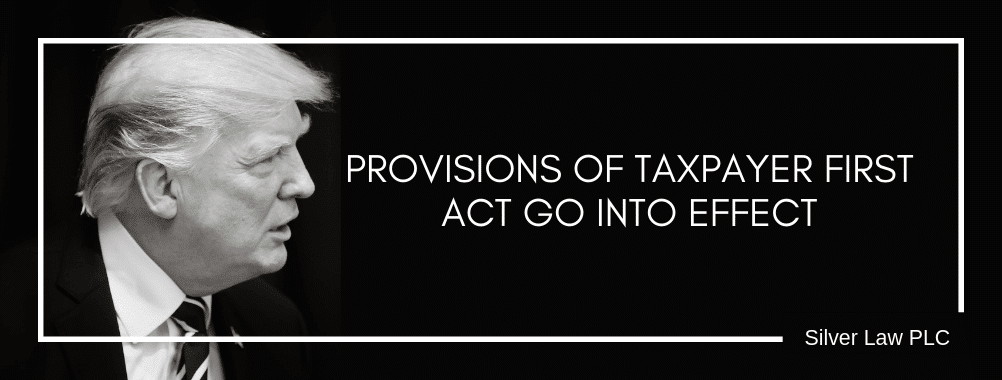Codes of Conduct for Tax Professionals Tax professionals are bound by a code of ethics…
Earlier this summer, President Trump signed into law the Taxpayer First Act with the goal of overhauling the IRS and improving the customer service provided to taxpayers. Specifically, the act puts limits on what the IRS can do, and it puts measures in place to better inform taxpayers about their rights and responsibilities.
The president signed the law on July 1, and three provisions of the law went into effect on Aug. 16. Here’s some more information about the new provisions:

The Taxpayer First Act prohibits the IRS from issuing a so-called “John Doe Summons,” which doesn’t identify the taxpayer specifically. The only exception allowing the IRS to issue such a summons would be if the agency is trying to get information pertaining to the failure of a person or group to comply with specific section of the code. The information that the IRS is trying to seek with the summons must also be narrowly tailored.
A Designated Summons is issued to a large corporation or to a person whom that corporation has transferred books and records that the IRS wants. The new provision in the Taxpayer First Act requires that the IRS’ Chief Counsel and the Commissioner of the operating division seeking the information must first review the summons and provide written approval before it can be issued. In addition, that written approval has to state the steps that the IRS took to get the information previously, and that information must be attached to the summons when it is issued.
If any judicial proceedings follow the summons, the IRS will be required to show that it took reasonable steps to get the information before issuing the summons.
In the past, the IRS may have tried to reach out to your friends, family members, or even work colleagues to get information about you or to get in touch with you if you owed a debt. The Taxpayer First Act stipulates that the IRS may not contact a third party about the collection of taxes. It is only allowed to contact the taxpayer directly.
If the IRS needs to contact a third party, it must provide notice to the taxpayer at least 45 days in advance. Previously, the rules states that the IRS only had to provide “reasonable notice” with no specific timeline. The new rule also stipulates that the IRS cannot have a period of contact of later than one year.
Overall, the new act and these provisions that are set to go into effect now are aimed at protecting taxpayer rights and improving the service that the IRS provides taxpayers. The IRS should not be given carte blanche to bully taxpayers or take whatever actions they want to collect taxes and debts. Just because the IRS is a government agency doesn’t mean that it will always operate properly or with your best interests in mind.
It’s important that you know your rights as a taxpayer so that you can protect yourself against any improper behavior from the IRS, as well as any unnecessary penalties. You can protect yourself by staying abreast of changes in the law, as well as by consulting with tax professionals like accountants or tax attorneys in Phoenix.
The experienced tax lawyers at Silver Law PLC can help you understand your rights under the new law and can defend you from improper actions by the IRS. Our attorneys can represent you during litigation, defending you against criminal or civil charges. Our goal is to help you avoid conviction, and where that’s not possible, to minimize the penalties you face.
We represent clients on a number of tax matters, including audits, innocent spouse relief, foreign holdings, and more. Our attorneys have all worked for the IRS in the past, so they have a unique understanding of how these cases are handled. They will use their experience and insight to fight for the best outcome for your case. They will help you understand your options every step of the way, and give you all the information you need to make the best choices. Call us in Arizona today to schedule a consultation with one of our experienced tax lawyers.
Published by:
Arizona Location
7033 E. Greenway Pkwy, Ste 200
Scottsdale, AZ 85254
Office:(480) 429-3360
Website: taxcontroversy.com
Nevada Location
410 South Rampart Blvd, Suite 390
Las Vegas, Nevada 89145
Office: 702-318-7130
Website: taxcontroversy.com
How Do I Handle a Criminal Tax Investigation By The IRS? Paying taxes is a…
Recent Injunctions Updates To Beneficial Ownership Reporting Requirements Breaking Down The Latest Changes To BOI…
What Should I Do If I Disagree With The Outcome Of An IRS Audit? Learn…
4 Tax Schemes From The IRS's "Dirty Dozen" List That Can Get The Average Taxpayer…